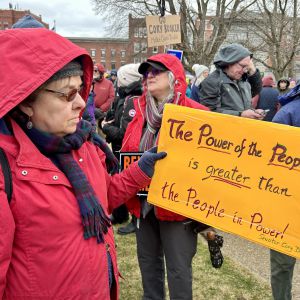Crime rates remain low, hold constant as city leaders voice rising safety concerns

Concord Police chief Bradley Osgood (on video screen) addressses the Concord City Council on Thursday, May 26, 2022. GEOFF FORESTER
|
Published: 05-29-2024 5:05 PM
Modified: 05-30-2024 9:58 AM |
Crime in Concord, which remains lower than many of its counterparts in the state, held relatively constant over the last five years and by broad metrics fell slightly in 2023, an annual report from the Concord Police Department shows.
At the same time, city leaders remain concerned about staffing shortages in the department and have said their constituents are increasingly concerned about public safety.
“We are a safe city. We’re one of the safest communities in the state, I think, when you compare it to the other bigger cities like Nashua or Manchester,” Deputy Chief John Thomas said.
Crimes against persons, such as assault, threatening or homicide, dropped 5.8% last year, while property crimes like theft or arson dropped 2.8% and crimes against society — such as driving under the influence and other drug-related offenses — were down 9.6%, the report said.
Calls for service — recording each instance of police involvement from emergency calls to traffic stops — and arrests each dropped 8.3% in 2023 after smaller increases in the previous two years.
“You have some crimes that have gone down, but then you have some that have gone up,” Thomas said of the department’s report. “The numbers are a little bit off, but you’re still where you were at a year or two ago.”
Thomas noted that recorded crimes could be dropping because of patrol staff shortages the department experienced last year. Turnover has been an issue in the department since the pandemic, but it hit a peak in 2023 when there were more than 20 vacancies, according to Thomas. An inability to do more proactive policing like traffic stops could mean a drop in police responses that doesn’t necessarily indicate a drop in crime, he said.
Within these trends, there are notable increases. Mental health-related calls for service rose 8.8%, motor vehicle thefts nearly doubled from 35 to 67 and there were 30 burglaries, up 11% from 2022.
Article continues after...
Yesterday's Most Read Articles
 ‘There was no oversight’: NH child advocate has been a watchdog for children's care. Now, the office is on the chopping block
‘There was no oversight’: NH child advocate has been a watchdog for children's care. Now, the office is on the chopping block
 Volunteer group wants to help homeless clean up their camp
Volunteer group wants to help homeless clean up their camp
 ‘Less finger pointing, more communication’: Longtime Chichester residents share hopes before second town meeting
‘Less finger pointing, more communication’: Longtime Chichester residents share hopes before second town meeting
 Casella Waste Systems’ landfill project in New Hampshire’s North Country denied permit
Casella Waste Systems’ landfill project in New Hampshire’s North Country denied permit
 New Healthy Buffalo owner to build market in Chichester
New Healthy Buffalo owner to build market in Chichester
 ‘It’s everything’: In largest rally yet, Trump protestors descend on Concord
‘It’s everything’: In largest rally yet, Trump protestors descend on Concord
Since the start of this council term, several city councilors have said their constituents report feeling less safe in the city.
“What we’re hearing from downtown business owners and residents is that they are feeling less safe, specifically in the downtown area,” at-large Councilor Amanda Grady Sexton said in an interview. “As a councilor, there is a sense that there is a change in Concord, and that things are getting more dangerous.”
Ward 3 Councilor Jennifer Kretovic said fear, “both real and imagined,” is rising in her ward about public safety. She attributed it in part to how the rising visibility of homelessness influences other residents’ assumptions about people who have lost housing.
“It is a fear that is surrounded by a sense of a greater presence of homelessness and unhoused people in our community,” Kretovic said. When people believe they are seeing more people without shelter and encampments, “they automatically make assumptions and leaps” of criminality.
Ward 7 Councilor Jim Schlosser said he also has heard these concerns from constituents but emphasized the importance of placing feelings of rising crime in context. Schlosser, a board member of the Concord Coalition to End Homelessness before joining the council, said he felt that crimes by people experiencing homelessness got disproportionate media coverage and scrutiny, leading them to be “sensationalized.”
“What people are reporting is very real. I don’t want to trivialize that,” he said. “But we have to correlate that to what the data shows.”
Mayor Byron Champlin said he was not hearing more concerns about public safety than normal, but that it remained one of the top things people reach out to their local leaders about.
Champlin also said that increases in the visibility of homelessness, and of those who lack shelter in the city, can play into people’s perceptions of public safety.
“It’s important to realize that homelessness is not a crime,” he continued. “I think that sometimes it’s just highlighted more, and people sometimes notice it more.”
After steadily declining for several years, there were 769 arrests in Concord of people who self-report as homeless — a 40% increase from 2022 and the highest since 2019, according to data obtained through a records request. That number does not discount people charged more than once.
The number of individual people getting arrested within that statistic was 193, similarly rising roughly 40% after years of decline. More than 80 of those people were arrested only once. Six people experiencing homelessness were arrested more than 15 times and 19 more than 10 times — those 19 people made up more than a third of the total arrests of people experiencing homelessness in 2023.
Other than bench warrants — issued for a failure to appear in court — and warrants for unspecified offenses, trespassing was the most commonly listed arrest reason and protective custody was close behind.
Thomas said he has heard from some councilors as well as directly from residents that people are increasingly worried about public safety and that they cite homelessness as driving those concerns.
“If you look at the crimes that are being committed downtown, I don’t see a rise in recorded crimes or stats,” Thomas said. “But that’s their impression… if people are saying that they don’t feel safe, we have to react to that.”
As summer begins, Thomas said there would be more bike and foot patrols downtown. He also pointed to the Concord Police’s new social worker, and plans to hire another, as part of the deparment’s response more broadly.
Grady Sexton has long chaired the city’s Public Safety Board, and Kretovic and Schlosser are both members. After meeting a few times a year over the past decade, and not at all last year, the board this year has met monthly. That change came in part because of an emphasis from Champlin — who began his term by assessing the array of boards and committees under his administration — on more regular meetings, Grady Sexton said, and also because the board was getting more items referred to it by the council.
With rising safety concerns and with ongoing staffing shortages at the police department, the Public Safety Board has increased its focus on the public safety impacts of homelessness, forming a subcommittee on the issue in February. As compared to the city’s existing Steering Committee for the Plan to End Homelessness, the board’s committee is looking more narrowly at the public safety impacts of parts of the city’s population of people experiencing homelessness.
A minority of that population is “creating a feeling of resentment in our community against people who are unhoused — and that is unfortunate,” Grady Sexton said. “We are not talking about criminalizing homelessness — I don’t think anyone believes this is a majority of our unhoused population.”
Alongside broader city efforts to collect better data on the issue, the board aims to better understand how big that group is and how both police and fire departments short on staff are able to respond, Grady Sexton said.
“We are in this perpetual cycle of asking our first responders to do so much more with less,” she said. “They want to do more preventative work and interventions and feeling the effect of these shortages to stop these cycles.”
Editor’s note: This article has been updated to reflect that Jim Schlosser is a former board member of the Concord Coalition to End Homelessness.







 Henniker ponders what is a ‘need’ and what is a ‘want’
Henniker ponders what is a ‘need’ and what is a ‘want’ Boscawen residents vote to fund major renovation of public works building
Boscawen residents vote to fund major renovation of public works building ‘Voting our wallets’: Loudon residents vote overwhelmingly against $1.7M bond for new fire truck
‘Voting our wallets’: Loudon residents vote overwhelmingly against $1.7M bond for new fire truck In Pembroke, Education Freedom Accounts draw debate, voters pass budget
In Pembroke, Education Freedom Accounts draw debate, voters pass budget
